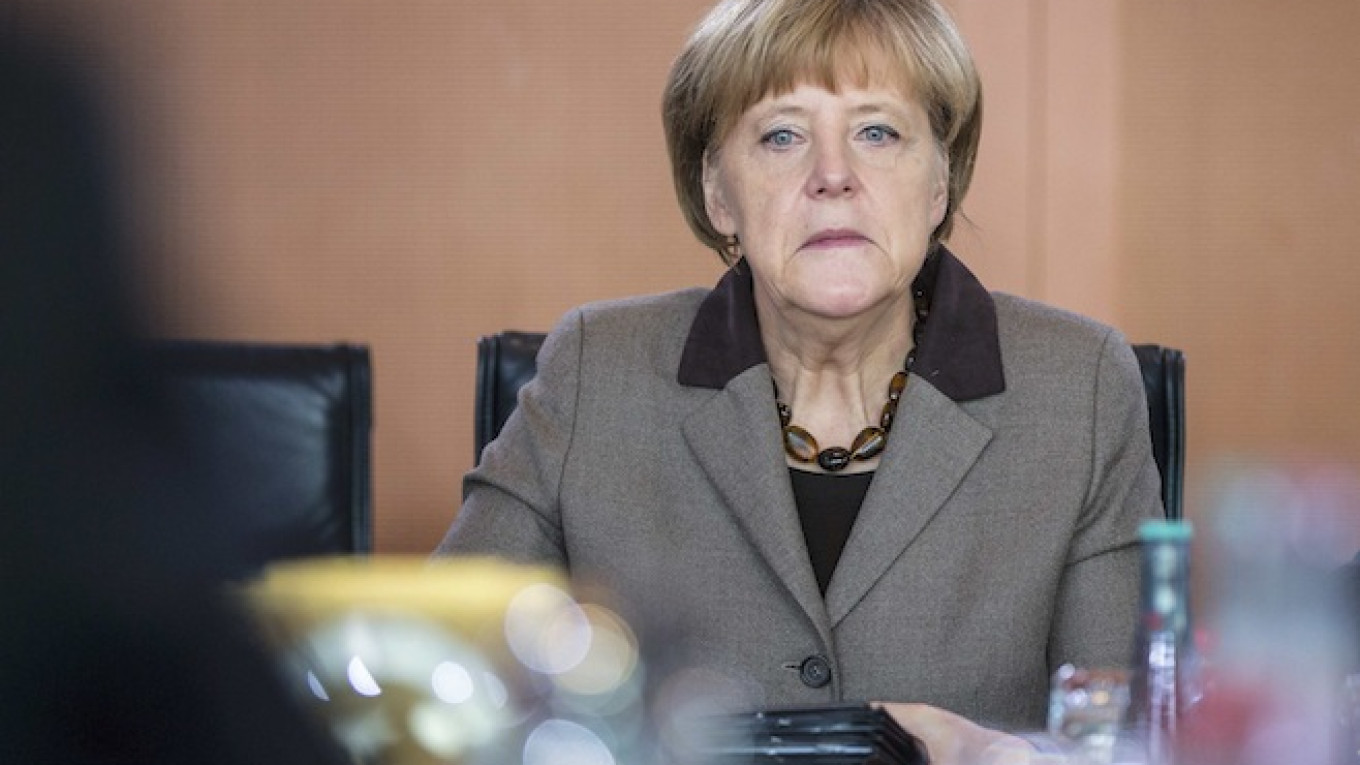German Chancellor Angela Merkel told President Vladimir Putin on the phone that Sunday's planned elections in eastern Ukraine were illegitimate and would not be recognized by European leaders, a Berlin government spokesman said Friday.
Merkel and Putin held a joint telephone conversation with French President Francois Hollande and Ukrainian President Petro Poroshenko, Merkel's spokesman Georg Streiter said at a government news conference.
He said in the call there were diverging opinions on Sunday's "so-called elections" in the self-proclaimed people's republics of Donetsk and Luhansk.
"Merkel and Hollande underlined there can only be a ballot in line with Ukrainian law," he said, adding that the vote would violate an agreement endorsed by Russia and further complicate efforts to end the crisis in eastern Ukraine.
"The German government will not recognize these illegitimate elections," Merkel's spokesman said. European leaders were united on this issue and had agreed on this at a summit last week in Brussels.
Over 3,700 people have been killed in fighting in eastern Ukraine, where pro-Moscow rebels seek union with Russia. A cease-fire has been in force since September but there have been isolated flareups of fighting.
A 12-point protocol, issued after talks in early September in the Belarussian capital of Minsk involving Russia, Ukraine, the Organisation for Security and Cooperation in Europe and separatist leaders, foresees the holding of "early local elections" in the east in accordance with Ukrainian legislation.
The Ukrainian leadership sees this as part of efforts to decentralize power in the east to give people there greater say in running their own affairs — a strategy aimed at blunting calls for autonomy. It wants to hold these elections in December.
Sunday's separatist poll is aimed at electing leaders and a parliament in a self-proclaimed autonomous republic.
Though Russian Foreign Minister Sergei Lavrov said last Tuesday that Moscow would recognize the results of the rebel vote, the Kremlin made no mention of the ballot in its account of the four-way phone-in on Friday.
"The Russian side speaks out in favor of establishing a sustainable dialogue between the central Ukrainian authorities and the representatives of the Donetsk and Luhansk regions which, beyond any doubt, would contribute to an overall stabilization of the situation," it said in a statement.
Poroshenko on his website said that he, Merkel and Hollande had expressed a "clear, general position" not to recognize Sunday's election and had "called on Russia also not to recognize these elections."
Speaking to a group of Western journalists on Friday, Ukrainian Foreign Minister Pavlo Klimkin denounced "totally fake, unlawful elections with people trying to elect so-called presidents of Donetsk and Luhansk and a so-called parliament."
"Russia must discourage the terrorists from carrying out these elections — it will be yet another step towards a 'frozen conflict' which is what we have to prevent there," he said.
He said Kiev was committed to elections of local officials in the east with which a plan for decentralization could be worked out. "But they should be clear local elections according to Ukrainian legislation," Klimkin said.
A Message from The Moscow Times:
Dear readers,
We are facing unprecedented challenges. Russia's Prosecutor General's Office has designated The Moscow Times as an "undesirable" organization, criminalizing our work and putting our staff at risk of prosecution. This follows our earlier unjust labeling as a "foreign agent."
These actions are direct attempts to silence independent journalism in Russia. The authorities claim our work "discredits the decisions of the Russian leadership." We see things differently: we strive to provide accurate, unbiased reporting on Russia.
We, the journalists of The Moscow Times, refuse to be silenced. But to continue our work, we need your help.
Your support, no matter how small, makes a world of difference. If you can, please support us monthly starting from just $2. It's quick to set up, and every contribution makes a significant impact.
By supporting The Moscow Times, you're defending open, independent journalism in the face of repression. Thank you for standing with us.
Remind me later.


